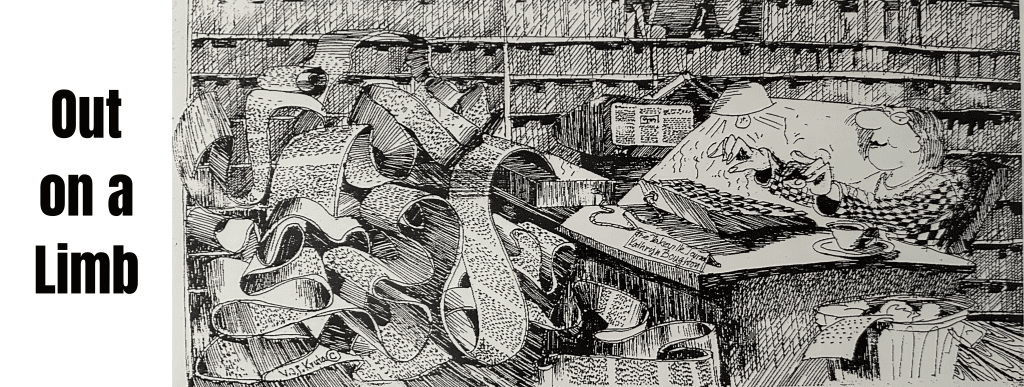When I was 17, I made my first trip to Ireland. It was my first and only transatlantic voyage, a five-day odyssey that I found boring then, and now, in retrospect, enriching.

In the moment, I did not realize I was experiencing the end of an era. Within 10 years of our sailing, six out of every 10 travelers were choosing to fly, effectively ending the days of the great ocean liners.
I was lucky to experience the tail-end of this classic form of travel but, in truth, it was transformative in only one way. On one of our days at sea, the ship offered some sort of game of chance for the entertainment of the passengers. I can’t remember what it was, but I wagered a dollar and lost.
In 1965, I worked as a projectionist at the local movie theater and earned minimum wage: $1.25 an hour. In a trice, I had wagered an hour of my life and had nothing to show for it. It was not a good feeling.
Only once since 1965 have I gambled my money.
Three decades ago, I had a friend who enjoyed visiting casinos. One afternoon, we stopped at the newly opened Mohegan Sun. While he frittered away a large sum of money, I decided I could stand to lose the two quarters in my pocket to a slot machine.
On my first try, it paid out a few more quarters. I put my own quarters back in my pocket and continued to play. Ultimately, I walked away with $14.50, including the two original quarters.
In the shuttle on the way back to our car, a couple sitting opposite us asked how my day had been. “Oh, great,” I replied. “I won.” They inquired how much, and I told them. Surprised, they said, “That isn’t much.” I asked how they had done. They had lost $600—so who had the better day?
Despite my own aversion to losing money, there is no doubt that gambling is huge in America. On Super Bowl Sunday, it was expected that Americans would legally wager $1.39 billion, up from $1.25 billion in 2024, according to the American Gaming Association.
But that was only the tip of the iceberg. Last year, the AGA estimated the total amount of all bets—everything from illegal sports books to office pools to casual wagers between friends—at about $23 billion.
These bettors enjoy, in the words of the late Howard Cosell, the “thrill of victory and the agony of defeat” as surely as does any athlete on the field. A Las Vegas bettor won $1 million dollars when the Chiefs beat the Bills for the AFC title, but rapper GloRilla reported she lost $128,000 betting on the Chiefs in the Super Bowl. Even if I had that kind of money to lose, my Puritan soul would wither and die.
H.L. Menken defined Puritanism as “The haunting fear that someone, somewhere, may be happy,” and I sometimes wonder if my dour take on gambling is a mirror of Menken’s sentiment.
Surely, some gamblers must go home happy, but at what cost to our society? I cannot overcome my disquiet over state-sponsored gambling that frequently feeds off the most vulnerable to feed the public coffers.
The temptation to derive funds from a voluntary activity is strong for states and more than a dozen now receive at least 10 percent of their general revenue from gambling.
But studies show that even where gambling profits are used for the common good—read lotteries—profits come from the most socially disadvantaged people and can be seen as a regressive tax.
People such as the Las Vegas bettor may put bigger sums on the line, but studies show that people with lower incomes spend a relatively larger portion of their total budgets on gambling and problem gambling is significantly linked with lower household incomes. These losses affect those with the least capacity to absorb them.
The Puritans tried desperately to stamp out gaming with physical punishment and fines, forcing it underground—which may account for some of its unsavory reputation.
Oddly, then, it was through the churches and upright civic organizations that it began to sneak back into the open in Connecticut when nonprofits were allowed to use games of chance to raise money—again for the public good. State controls required permits and licenses and the legislature legalized Bingo in 1939, bazaars and raffles in 1955.
Attitudes softened enough by 1972 to allow nonprofits to operate casino games during Las Vegas Night fundraisers. Four years later, off-track betting and greyhound racing began, followed in the 1990s by the establishment of full-fledged casinos on tribal lands.
Changes took place at the federal level when, in 2018, the Supreme Court overturned a federal law prohibiting most states from legalizing sports betting. In less than two years, the number of states with legal sports betting accelerated from one to 31, in addition to the District of Columbia. The number now stands at 38.
Add the growth of online betting and AI and it becomes a toxic stew that has mental health and addiction experts worried.
Sports betting can be done anywhere, from a sports bar to the dinner table, on a smartphone or other mobile device. “Everyone now has a casino in their pocket,” Keith Whyte, director of the National Council on Problem Gambling, told “The Nation’s Health” in 2022.
The gambling industry is making the most of it, investing in internet and mobile platforms as well as manipulative advertising campaigns.
Last September, Connecticut Senator Richard Blumenthal and New York Representative Paul Tonko introduced the Supporting Affordability and Fairness with Every Bet (SAFE Bet) Act , which seeks to put limits on this Wild, Wild West betting landscape.
Predicted to face a long slog to pass into law, the Act would prohibit gambling operators from running advertisements between 8 a.m. and 10 p.m. and during live sporting events.
It would also prevent operators from accepting more than five deposits from a customer within 24-hours; prohibit operators from accepting credit card deposits; and require gambling companies to conduct affordability checks on customers before they place wagers of more than $1,000.
The legislation also calls for a nationwide “Self-Exclusion List,” which operators would have to check before accepting wagers from customers.
Blumenthal termed the proposed legislation “a matter of public health,” that would help to stop addiction, save lives and make sure that young people are protected from exploitation.
The social experiment of Prohibition in the 1920s gives us ample evidence that trying to eliminate a behavior that people enjoy is counterproductive, although Blumenthal and Tonko are right to try to build in constraints on the gambling industry.
But I’ll bet you my bottom dollar they are not successful.
Kathryn Boughton is Editor of the Kent Dispatch. The views expressed are not necessarily those of Kent News, Inc., the parent company of the Kent Dispatch.

































